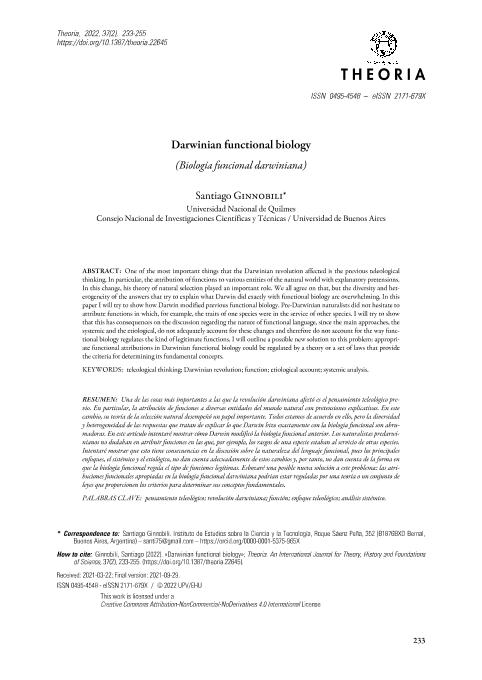Mostrar el registro sencillo del ítem
dc.contributor.author
Ginnobili, Santiago

dc.date.available
2023-06-14T15:02:13Z
dc.date.issued
2022-06
dc.identifier.citation
Ginnobili, Santiago; Darwinian functional biology; Universidad del País Vasco; Theoria; 37; 2; 6-2022; 233-255
dc.identifier.issn
0495-4548
dc.identifier.uri
http://hdl.handle.net/11336/200564
dc.description.abstract
Una de las cosas más importantes a las que la revolución darwiniana afectó es el pensamiento teleológico previo. En particular, la atribución de funciones a diversas entidades del mundo natural con pretensiones explicativas. En este cambio, su teoría de la selección natural desempeñó un papel importante. Todos estamos de acuerdo en ello, pero la diversidad y heterogeneidad de las respuestas que tratan de explicar lo que Darwin hizo exactamente con la biología funcional son abrumadoras. En este artículo intentaré mostrar cómo Darwin modificó la biología funcional anterior. Los naturalistas predarwinianos no dudaban en atribuir funciones en las que, por ejemplo, los rasgos de una especie estaban al servicio de otras especies. Intentaré mostrar que esto tiene consecuencias en la discusión sobre la naturaleza del lenguaje funcional, pues los principales enfoques, el sistémico y el etiológico, no dan cuenta adecuadamente de estos cambios y, por tanto, no dan cuenta de la forma en que la biología funcional regula el tipo de funciones legítimas. Esbozaré una posible nueva solución a este problema: las atribuciones funcionales apropiadas en la biología funcional darwiniana podrían estar reguladas por una teoría o un conjunto de leyes que proporcionen los criterios para determinar sus conceptos fundamentales.
dc.description.abstract
One of the most important things that the Darwinian revolution affected is the previous teleological thinking. In particular, the attribution of functions to various entities of the natural world with explanatory pretensions. In this change, his theory of natural selection played an important role. We all agree on that, but the diversity and heterogeneity of the answers that try to explain what Darwin did exactly with functional biology are overwhelming. In this paper I will try to show how Darwin modified previous functional biology. Pre-Darwinian naturalists did not hesitate to attribute functions in which, for example, the traits of one species were in the service of other species. I will try to show that this has consequences on the discussion regarding the nature of functional language, since the main approaches, the systemic and the etiological, do not adequately account for these changes and therefore do not account for the way functional biology regulates the kind of legitimate functions. I will outline a possible new solution to this problem: appropriate functional attributions in Darwinian functional biology could be regulated by a theory or a set of laws that provide the criteria for determining its fundamental concepts.
dc.format
application/pdf
dc.language.iso
eng
dc.publisher
Universidad del País Vasco
dc.rights
info:eu-repo/semantics/openAccess
dc.rights.uri
https://creativecommons.org/licenses/by-nc-nd/2.5/ar/
dc.subject
PENSAMIENTO TELEOLÓGICO
dc.subject
REVOLUCIÓN DARWINIANA
dc.subject
FUNCIÓN
dc.subject
ENFOQUE TELEOLÓGICO
dc.subject
ANÁLISIS SISTÉMICO
dc.subject.classification
Filosofía, Historia y Filosofía de la Ciencia y la Tecnología

dc.subject.classification
Filosofía, Ética y Religión

dc.subject.classification
HUMANIDADES

dc.title
Darwinian functional biology
dc.title
Biología funcional darwiniana
dc.type
info:eu-repo/semantics/article
dc.type
info:ar-repo/semantics/artículo
dc.type
info:eu-repo/semantics/publishedVersion
dc.date.updated
2023-06-13T14:42:47Z
dc.identifier.eissn
2171-679X
dc.journal.volume
37
dc.journal.number
2
dc.journal.pagination
233-255
dc.journal.pais
España

dc.journal.ciudad
San Sebastián
dc.description.fil
Fil: Ginnobili, Santiago. Universidad de Buenos Aires; Argentina. Universidad Nacional de Quilmes. Departamento de Cs.sociales. Instituto de Estudios Sobre la Ciencia y la Tecnologia. Centro de Estudios de Filosofia E Historia de la Ciencia.; Argentina. Consejo Nacional de Investigaciones Científicas y Técnicas; Argentina
dc.journal.title
Theoria

dc.relation.alternativeid
info:eu-repo/semantics/altIdentifier/url/https://ojs.ehu.eus/index.php/THEORIA/article/view/22645
dc.relation.alternativeid
info:eu-repo/semantics/altIdentifier/doi/https://doi.org/10.1387/theoria.22645
Archivos asociados
